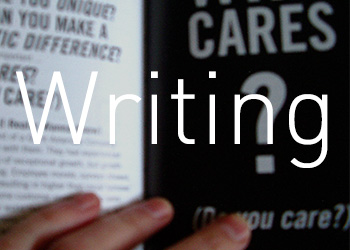Presentation Secrets
Tom Peters
So you’re not always the life of the party. Nor did you captain your high school debate team. And figuring differential equations turns you on more than a crackling recording of Roosevelt’s fireside chats.
None of this will block a sparkling career. But let’s face it, if you could give scintillating presentations, you’d be one happy camper. We all need potent persuasive skills to rope in outside money and supporters from time to time. Like it or not, then, a knack for communicating in “public” is vitally important.
Having been a 150-times-a-year, for-profit yakker, I offer this advice:
1. Practice makes better. Obvious as it sounds, too many ignore it. There are damn few natural composers, golfers, or race car drivers. And there are no natural speakers—at least I’ve never come across any. You get better at speaking by speaking, and speaking. It takes 10 years of tough training to become a journeyman physicist, so why should you expect to pick up sophisticated presentation skills “by the seat of your pants”?
2. Join Toastmasters. Toastmasters International is the Alcoholics Anonymous of the speaking world. Its ranks include generals, pastors, and politicians, plus hundreds of thousands of scared speechless engineers, accountants, supervisors, and vice presidents, to name a few.
Toastmaster’s “guidelines” for good speaking are a touch too rigid for my taste, but the core idea is sound: You learn to get over your stage fright by starting small and constantly practicing (see No.1 above). Seek out a local chapter and sign up—large companies sometimes even have their own chapters.
3. Forget all the conventional “rules” but one. Frankly, most laws of speechmaking—keep your hands out of your pockets, don’t say “uh,” lead off with a zinger—are garbage. But there is one golden rule: Stick to topics you care deeply about, and don’t keep your passion buttoned inside your vest. An audience’s biggest turn-on is the speaker’s obvious enthusiasm. That’s as true for a pitch to purchase a $200,000 computer system as it is for a plea to save the environment. If you’re lukewarm about the issue, forget it!
4. Stories, stories, more stories. Charts and graphs have their place, and a pretty prominent one in many business presentations. Nonetheless, even an analytically inclined audience will remember one poignant comment from a survey respondent (“this company really doesn’t listen to the likes of us”) long after forgetting your multicolored bar chart showing the firm’s “openness to ideas” at 2.62 on a seven-point, sociometrically valid scale.
The best speakers, president or Ph.D. chemist, lavishly illustrate their talks with short, striking vignettes. In fact, the most potent speeches are often little more than strings of such vignettes, loosely linked by an outline.
5. For heaven’s sake, don’t write it out! If spontaneity isn’t everything, it verges on it. That hardly means winging it: Careful preparation spawns spontaneity. But it does mean never, ever writing it out in full. If you do, you become a slave to your exact wording and inevitably lose 75 percent of any emotional impact.
6. Don’t even think about getting it “right.” After decades of giving speeches, from five minutes to five days (with breaks!) in length, I’ve yet to be satisfied with one of them. But tomorrow is another day. Forget the “this is my only chance to shine” baloney. If you’re worth a darn, you’ll get lots of chances to shine—and that one, 10-minute appearance in THE BOARDROOM, at age 28, won’t decide your career. If you believe “this is it,” you’ll be so tight you’ll swing before the pitcher even finishes his wind-up.
7. Breathe! I’m no pro when it comes to meditation. I get flush and breathless before any speech, to this day. One answer is to close your eyes (or not), and take five or 10 deep breaths (even in front of others) before going up on stage to chair that big meeting.
8. Get away from the podium. You’re probably not a stiff around the office, and almost certainly not at home. Why be a stiff when you’re making an important presentation? Put your notes on index cards (written in bold letters if your eyes, like mine, ain’t getting younger), so you won’t be nailed to the lectern. Then wander—around the table, into the crowd, about the platform. Look comfortable and your audience will be more comfortable, too.
9. Loosen up, you’re not going to convince ’em anyway. Speeches aren’t about turning arch enemies into cheering supporters. Martin Luther King’s “I Have a Dream” speech hardly converted George Wallace into a champion of civil rights. Presentations are mainly opportunities to reassure those who already agree with you that you’re a horse worth betting on. (King’s speech roused his supporters toward greater efforts.) The heart of board or committee work is one-on-one discussions before any formal discourse. So try to relax and enjoy yourself, to present “excited you” as excited you—which is just what the audience wants.
(C) 1991 TPG Communications.
All rights reserved.

